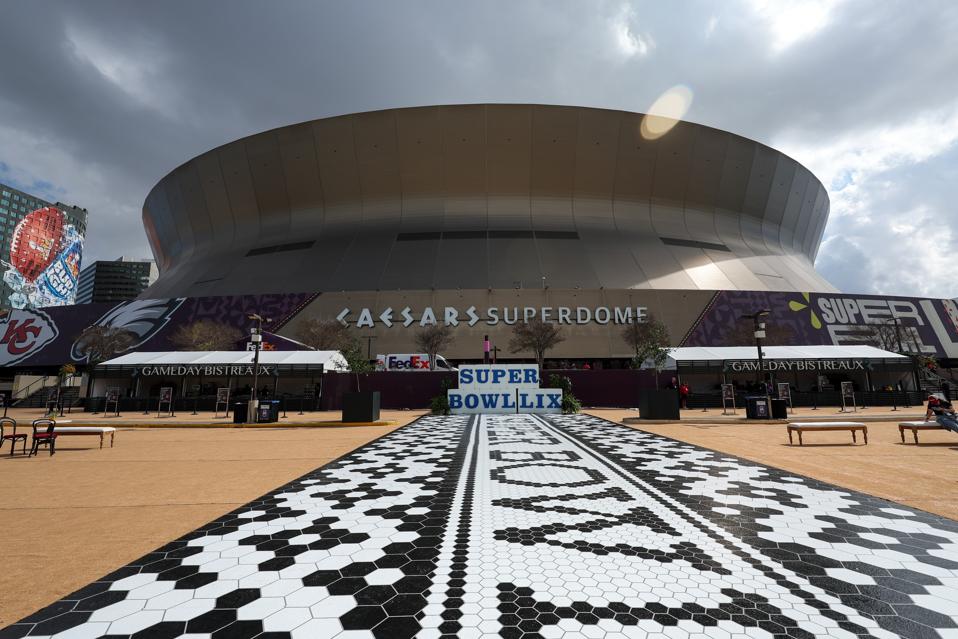The third time in a row might not have been a charm for the back-to-back Super Bowl champion Kansas City Chiefs, but the 11th time provided a financial windfall for New Orleans.
Super Bowl LIX — the 11th Super Bowl hosted in the Big Easy — brought in $1.25 billion to Louisiana’s economy.
“It was an incredible impact,” Jay Cicero, the president/CEO of the Greater New Orleans Sports Foundation and the New Orleans Super Bowl Host Committee, exclusively shared.
That economic impact was greater than the Super Bowl LVIII, the Super Bowl played the year before.
And it was more than double the previous Super Bowl in New Orleans. That Super Bowl XLVII week, leading up to and including the game between the Baltimore Ravens and San Francisco 49ers on Feb. 3, 2013, created an economic impact of $480 million.
Though slightly less than the $1.3 billion economic activity generated from Super Bowl LVII in Arizona — which also featured the same Philadelphia Eagles-Chiefs matchup — Super Bowl LIX in New Orleans impressively outpaced the $1 billion worth of spending in Las Vegas from Super Bowl LVIII.
Although last year’s game represented the first Super Bowl for Las Vegas, Super Bowl LIX enabled New Orleans to tie Miami as the city that has held the big game the most times.
Fewer Visitors Than Las Vegas … But Bigger Spenders
More than the increase in foot traffic, Kennedy Smith, vice president of marketing for Caesars New Orleans Hotel and Casino, noticed the uptick in spending.
The people, who travel in for a Super Bowl, are typically high-rollers, and those in the casino spent 90% of their time at table games rather than cheaper slot machines.
“This was a lot more quality over quantity,” Smith said. “The average play per customer — that’s where we saw the huge spike.”
Smith’s observations follow the data collected from the LSU Center for Economics, Business and Policy Research; New Orleans Super Bowl Host Committee; NFL and sponsors.
Las Vegas had more visitors last year. (More than 260,000 visitors descended on the Nevada city just for the week’s experience and did not even go to the game.) But the New Orleans visitors spent more per capita.
Gross visitor spending in Las Vegas for Super Bowl LVIII surpassed $877 million, and visitors in town for the Super Bowl spent an average of $2,660.
New Orleans welcomed approximately 100,000 visitors, and their average duration of stay was 3.5 nights. The visitors, who attended Super Bowl LIX, spent an average of $5,553, generating a total of $351.6 million, and those, who came to Louisiana for the Super Bowl but did not attend the game, spent an average of $4,246, resulting in $148.6 million.
To accommodate that influx of business, Caesars New Orleans added hundreds of temporary staff, housing them in Biloxi, Miss. and bussing them in each day. That’s just one example of the 9,787 jobs created by Super Bowl LIX.
Including the Caesars New Orleans, the Crescent City has 26,000 downtown hotel rooms in a two-mile triangle between the sports district (anchored by the Caesars Superdome), the business district (America’s sixth largest convention center) and leisure district (the French Quarter).
Unlike sprawling locations of many of the previous Super Bowls in Phoenix, Los Angeles, Miami and next year’s game in the Bay Area, New Orleans had the advantage of being more centralized.
“We’re a very compact city,” said Walt Leger, president and CEO of New Orleans & Company (formerly known as the New Orleans Convention and Visitor’s Bureau.)
Having adopted the “Built to Host” mantra, New Orleans has been the home for Final Fours, college football national championships, NBA All-Star Games and, of course, Mardi Gras, an annual, two-week celebration.
“We’re used to these big events,” Cicero said.
A 12th Super Bowl for New Orleans?
Cicero said the main difference he noticed between Super Bowl LIX and New Orleans’ previous Super Bowl was the number of special and corporate events, including Super Bowl LIX Opening Night at Caesars Superdome, the interactive Super Bowl Experience at Ernest N. Morial Convention Center, the Taste of the NFL at The National WWII Museum and the Mardi Gras-like Super Bowl Parade from the Esplanade Avenue and Decatur Street to St. Charles Avenue in the Warehouse District.
That kind of vendor spending from the host committee, media and sponsors of Super Bowl LIX resulted in an additional $180.3 million.
Super Bowl LIX also generated $82.7 million in taxes.
That economic boon is why New Orleans welcomes the opportunity to host Super Bowls. And for the NFL, New Orleans is also an obvious setting for several reasons. In addition to having a continuous NFL team (unlike Los Angeles or Phoenix) in the city since 1967, it has tourist attractions, warm weather and a dome.
But any indication of a 12th Super Bowl being played in New Orleans is very preliminary at this point. Cicero and his sports foundation, though, are encouraged.
“The response from the NFL was very positive,” Cicero said. “Whenever you successfully host, it gives you confidence that you’ll get it back sooner rather than later.”

